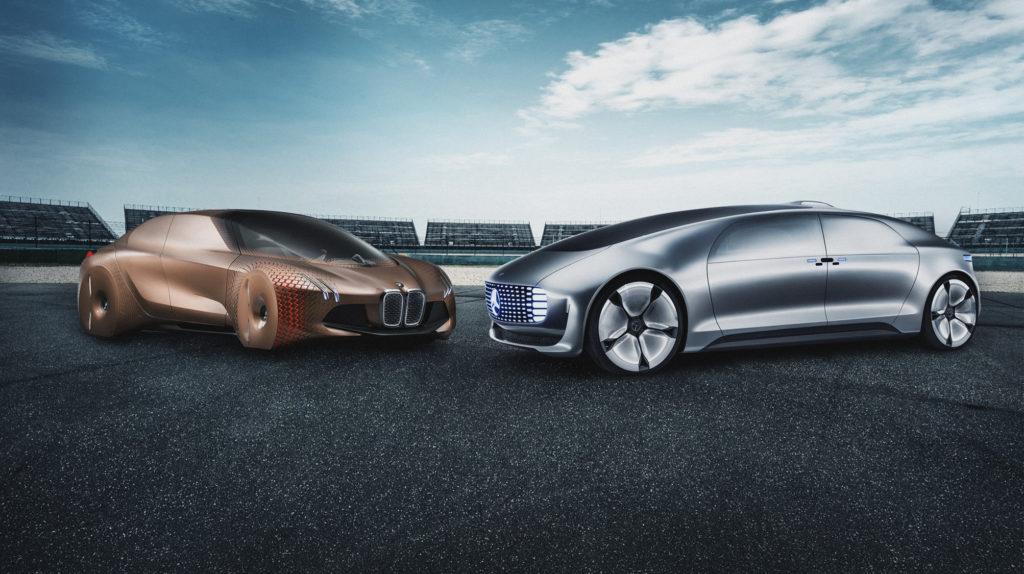An outgrowth of plans that were first made public last year, a joint venture between BMW and Daimler has since been cleared by regulators, and a $1,100,000,000 investment in merged mobility services has now been announced. We last reported on the progress between the two German automotive giants last year, and now, more details have been released, including specific branding of the forthcoming services, and planned collaborative development of next-generation autonomous driving technology that will be shared between both firms.
A German executive wearing jeans? Things really are changing.
As of our last story on the subject, which is linked above, there still existed broad overlap between the various mobility, ride-sharing, car rental, parking and other services provided by BMW and Daimler. Moreover, as recently as last summer, BMW was still launching some of these services in select focus markets within the U.S., like Seattle, Washington. It seems like BMW won out as far as branding is concerned, as the previous dozen different offerings have now been consolidated into five distinct operational realms, which are as follows; REACH NOW, for multi-modal transport like ride sharing, car rental or public transit fare, CHARGE NOW, for easy access to public charge points along with standardized payment, PARK NOW, for ticketless on- or off-street parking, FREE NOW, for hailing of taxis, private chauffeurs driving rented vehicles or electric scooter rental, and finally, SHARE NOW, a service for free-floating, dock-less car sharing.
These different services and solutions have varying availability across the world. REACH NOW has just recently begun limited operations in the U.S., but is expected to add more cities as time goes on. CHARGE NOW is a service by Digital Charging Solutions GmbH, and offers access to over 100,000 charge points across 25 counties. PARK NOW works in Europe and the U.S., and provides service to over 30,000,000 customers in more than 1,100 cities. FREE NOW serves more than 21,000,000 customers in Europe and Latin America, connecting them with over 250,000 drivers. SHARE NOW links 4,000,000 worldwide customers with the current fleet of 20,000 cars in 31 different cities.
Administrative operations are headquartered in Berlin, Germany, with each division assigned its own CEO and CFO. Over the next few years, up to 1,000 new jobs will be created in the area as a result of the venture, which is still very much in an investment and development phase.
On the autonomous drive technology front, BMW and Daimler have agreed to collaborate and share development going forward. The agreement, announced a few days after the mobility services merger, is expected to yield benefits in terms of shortening the time needed to bring new technologies to market, allowing the companies to speed up their deployment forecasts as far as the various levels of autonomy are concerned.
The teaming up will not preclude the progress of any current collaborations with other companies, such as Daimler working with parts manufacturing and tech giant Bosch, which is operating a pilot test program of self-driving cars in California.
Two automotive giants, who’ve long prided themselves on quality and technology, taking on the likes of Silicon Valley firms like Uber and Waymo in the autonomous driving sphere makes quite a bit of sense. Although technology is evolving at a pace faster than many of us are comfortable with, BMW and Daimler have over 200 years of automotive experience between them, and boast matured and refined supply chains that work with respected, cutting edge manufacturers and OEMs across the globe. When it comes to ride- and car-sharing, automakers also hold the advantage of being the ones who make the necessary hardware, a business that, as we are learning with Tesla, cannot be established overnight.
As societal focus shifts from vehicle ownership as a viable concept to simply looking to solve the overarching problem of mobility, consolidation, like what we are witnessing between generational rivals BMW and Mercedes-Benz, is likely to increase as time goes on, as industry leaders of historical bellwethers look to take on tech startups with hopes of shaking up the whole scene. It’s still far too soon to tell if these moves will bear fruit, but no matter how you look at it, now is certainly an interesting time in the car business.—Alex Tock
[Photos courtesy BMW AG.]
